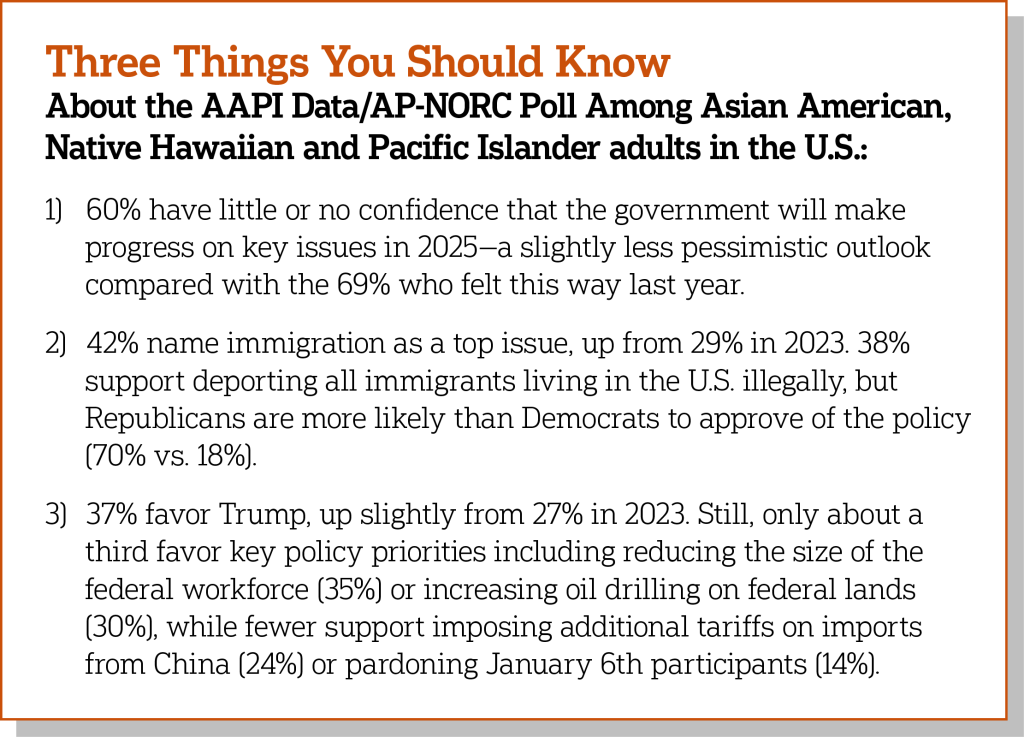
January 15, 2024
While Donald Trump’s favorability has improved slightly among AAPI adults, most still oppose various parts of his policy agenda.
Just before Donald Trump returns to the White House, a new AAPI Data/AP-NORC survey finds 31% of Asian American, Native Hawaiian and Pacific Islander (AAPI) adults believe the country is heading in the right direction, similar to the share (29%) of the general population who felt the same when last asked in December 2024. Optimism among AAPI Republicans increased with Trump’s electoral victory. Just 23% thought the country was headed in the right direction in November 2023, compared to 53% now. And AAPI Democrats are now more pessimistic. Sixty-one percent felt the country was on the wrong track in November 2023; now 81% feel that way.
AAPI communities’ confidence in the United States’ ability to tackle major challenges to the democracy in 2025 remains low, with most expecting little to no progress in reducing partisanship in Congress (71%), unifying the country (70%), increasing trust in government (67%), or improving voter confidence (60%).
Respondents to the nationally representative survey of AAPI adults were asked to identify up to five key issues they believe should be top priorities for the federal government in the coming year. Immigration tops the list, with 42% identifying it as a key issue, followed by foreign policy issues (33%), and inflation (32%). These priorities track closely with those of the broader U.S. population in December 2024, where 47% cite immigration, 32% foreign policy issues, and 29% inflation. Immigration has risen as a concern among AAPI adults, growing from 29% last year to 42% now, following months of heated rhetoric and misinformation about the issue during the campaign.
Other frequently mentioned concerns include the economy (31%), environment and climate change (28%), healthcare reform (18%), and education (18%).
Confidence in the federal government’s ability to address the nation’s challenges in 2025 remains low among AAPI adults, with 60% expressing little or no confidence and only 11% feeling highly confident. While still quite pessimistic, AAPI Republicans are seven times as likely than AAPI Democrats to express confidence (28% vs. 4%).
AAPI adults show mixed support for various policies that Donald Trump proposed during the presidential campaign, with the highest approval for eliminating taxes on tipped earnings (48%). Roughly a third favor deporting all undocumented immigrants (38%), reducing the size of the federal workforce (35%), or increasing oil drilling on federal lands (30%). Support is lower for policies like imposing additional tariffs on imports (24%) or pardoning January 6th participants (14%).
Partisan divides are evident among AAPI adults, with Republicans far more likely than Democrats to support policies like deporting all immigrants living in the U.S. illegally (70% vs. 18%), increasing drilling on federal lands (65% vs. 14%), or reducing the federal workforce (61% vs. 19%).
Support for these policies provides additional insights on people’s issue priorities for 2025. For example, those who named immigration as a top issue priority are more likely to back deportations (55% vs. 24%), while those who identified climate change tend to oppose both expanding oil drilling (57% vs. 33%) and cutting clean energy investments (68% vs. 47%).
Six in 10 AAPI adults hold an unfavorable view of Trump, a slight improvement from October 2023 when 70% viewed him unfavorably. Opinions are similarly divided for other leaders, with about half expressing unfavorable views of the incoming vice president, JD Vance (53%), and the outgoing president, Joe Biden (55%) and vice president, Kamala Harris (47%).
Confidence in Trump’s ability to govern during his second term is low among AAPI adults across key areas of leadership. Just 20% are extremely or very confident in his ability to effectively manage the White House, the military, or government spending. Confidence is similarly low regarding his ability to appoint well-qualified officials (19%). However, AAPI Republicans are much more optimistic about Trump’s abilities to govern in all areas compared with AAPI Democrats.
Few AAPI adults have confidence in Donald Trump’s ability to positively impact the economy such as creating more jobs (20%), or lowering the cost of groceries (16%), housing (15%), or health care (12%). Again, confidence in Trump varies sharply by party affiliation. AAPI Democrats express far less confidence in him on these issues compared with AAPI Republicans.

The nationwide study was conducted by The AP-NORC Center for Public Affairs Research and AAPI Data from December 9–17, 2024, using the Amplify AAPI Monthly survey drawing from NORC’s Amplify AAPI® Panel designed to be representative of the U.S. Asian American, Native Hawaiian, and Pacific Islander household population. Online and telephone interviews were offered in English, the Chinese dialects of Mandarin and Cantonese, Vietnamese, and Korean with 1,045 Asian American, Native Hawaiian, and Pacific Islanders aged 18 and older living in the United States. The margin of sampling error is +/- 4.9 percentage points.





